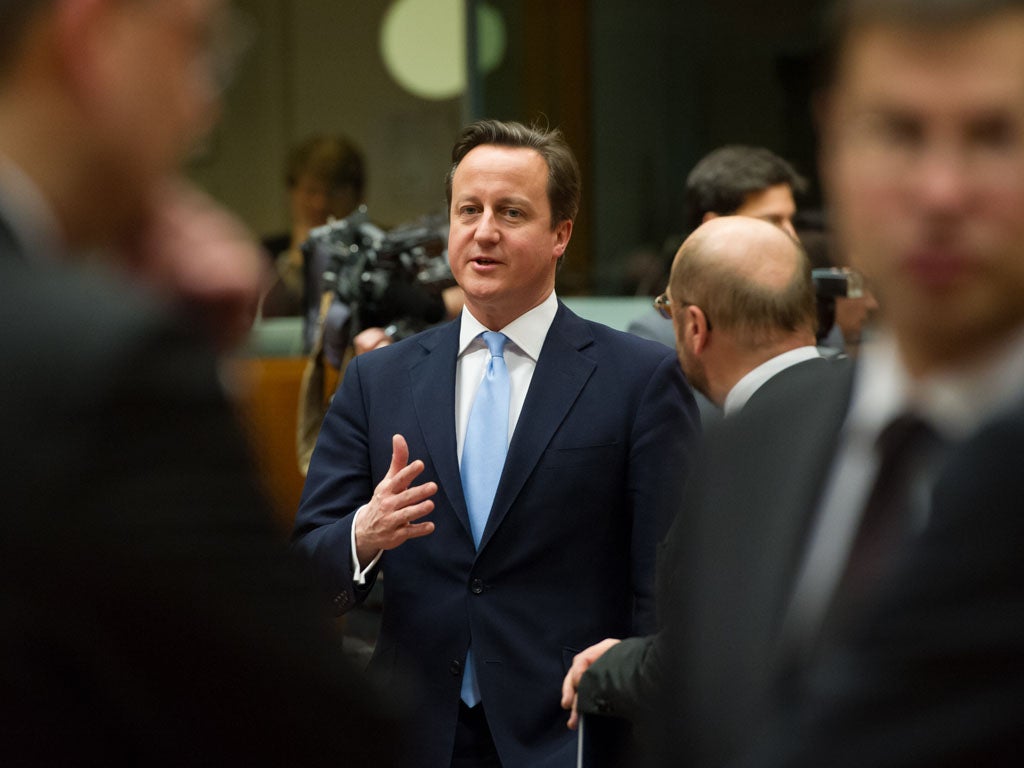Your support helps us to tell the story
From reproductive rights to climate change to Big Tech, The Independent is on the ground when the story is developing. Whether it's investigating the financials of Elon Musk's pro-Trump PAC or producing our latest documentary, 'The A Word', which shines a light on the American women fighting for reproductive rights, we know how important it is to parse out the facts from the messaging.
At such a critical moment in US history, we need reporters on the ground. Your donation allows us to keep sending journalists to speak to both sides of the story.
The Independent is trusted by Americans across the entire political spectrum. And unlike many other quality news outlets, we choose not to lock Americans out of our reporting and analysis with paywalls. We believe quality journalism should be available to everyone, paid for by those who can afford it.
Your support makes all the difference.Over two thirds of the British public think David Cameron got a bad deal for Britain in his EU renegotiations, a new poll shows.
The snap poll conducted by Sky News found 69 per cent of people thought the deal was “bad for Britain” while only 31 per cent said it was “good for Britain”.
The early public response to the draft document, which was released yesterday, does not look good for Mr Cameron – who has referred to it as the “strongest package ever”.
A supporter of EU membership, had entered in the negotiations with the aim of shoring up support for his position.
But a number of serial eurosceptic MPs from Mr Cameron’s own party have derided the offer, which does not appear to deliver the immigration and welfare restrictions promised in the Conservative manifesto.
Jacob Rees-Mogg, a leading eurosceptic backbencher told the PM that “the thin gruel has been further watered down”. He declared that the Prime Minister had a fortnight to "salvage his reputation as a negotiator".
Former defence secretary Liam Fox branded the document “watered down in every area” while Sir Bill Cash said Mr Cameron had “bypassed so many promises and principles”.
The response from eurosceptic newspapers to the deal has also been negative, with The Sun saying it “stinks” and the Daily Express branding it “a joke”.
The negative reaction to the package could undermine support for European Union membership.
Polls on the UK’s referendum are currently inconclusive and beset by methodological issues, but appear to currently show a small lead for “in”.
Measures of public opinion on the EU have in the past appeared to be extremely volatile, however – meaning a referendum victory is far from secure for Mr Cameron, who wants to stay in the EU.
The Prime Minister has said the “legally binding” agreement represented “real progress” but that the process was “far from over”.
“We want to deal with the pressures of immigration, which have become too great,” he told the House of Commons.
“The draft text represents the strongest package we’ve ever had in tackling the abuse of free movement and closing down the backdoor routes the Britain.
“There are new proposals to reduce the pull factor that our benefit system exerts across Europe by allowing instant access to welfare from the day someone arrives.”
The Prime Minister had previously said he would negotiate new rules so that EU migrants “must live her e and contribute for four years before they qualify for in-work benefits or social housing”.
However, Mr Cameron has only been offered powers to limit in-work benefits partially, with the amount of social security paid to migrants gradually increasing over the four year period.
Mr Cameron will have to convince other EU nations at a summit later this month as well as his own MPs and the British people of the deal’s effectiveness.
After the deal is taken forward Mr Cameron will hold a referendum on European Union membership – expected before the end of 2017 but possibly as early as this summer.
After pressure from the Scottish Welsh, and Northern Ireland governments Mr Cameron said the referendum would not be held closer than six weeks after the local and regional elections this May.
Those devolved administrations are seeking further assurances on the matter of timing, however.

Join our commenting forum
Join thought-provoking conversations, follow other Independent readers and see their replies
Comments